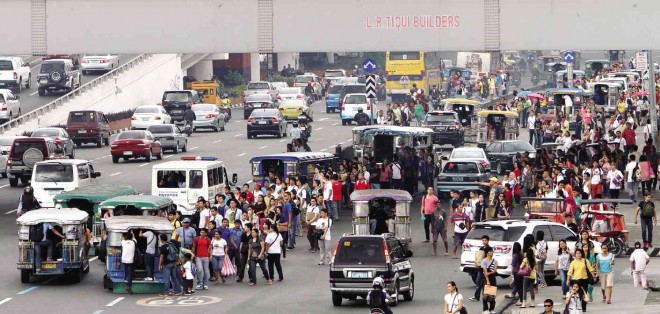DOTC firm on stiffer ‘colorum’ fines

Commuters wait in vain for a ride on Commonwealth Avenue in Quezon City as PUV drivers and operators go on a transport holiday to protest against higher penalties for colorum vehicles. LYN RILLON
MANILA, pHilippines–The Department of Transportation and Communications (DOTC) refused to back down on Thursday from imposing stiffer fines on operators of colorum or illegal public utility vehicles (PUVs) even as transport groups conducted a protest caravan.
“We issued the revised fines and penalties to better ensure road discipline and safety for the public. If these groups are not violating traffic rules and safety measures, then what are they protesting about? It is time for them to follow rules like everyone else and to practice discipline and orderliness on the road,” Transport Secretary Joseph Abaya said.
“Commuters put their safety in the hands of transport operators every day. It is the government’s obligation to make sure that PUV operators are responsible in delivering their services. That is why we issued the Joint Administrative Order,” he added.
Joint Administrative Order (JAO) No. 2014-01 of the DOTC, the Land Transportation Office (LTO) and the Land Transportation Franchising and Regulatory Board (LTFRB) sets higher fines and penalties for various violations of transportation rules and regulations, including a P1 million fine for colorum buses. It took effect on Thursday, threatening the operation of illegal or unauthorized PUVs.
“We call on these transport groups to be responsible in serving the public. Apart from obeying traffic rules, they should not abandon their obligation to commuters, many of whom had difficulty in getting rides today. If they continue to violate the conditions of their franchise, then what is the point of having them? ” Abaya said.
Article continues after this advertisementThe protest caravan organized on Thursday by transport groups to protest the JAO was a success or a flop, depending on who was talking.
Article continues after this advertisementFor the Metropolitan Manila Development Authority, the mass action failed as “it did not paralyze transportation [operations] in the metropolis. It ended peacefully and we recorded no untoward incidents,” Emerson Carlos, the agency’s assistant general manager for operations, said in a phone interview.
He estimated that although some 1,000 people were stranded as a result of the protest caravan in Quezon City, buses and military trucks offering free rides took them to their destinations between 6:30 a.m. and 1 p.m.
2,000 stranded in QC
Quezon City officials, however, cited a higher figure, saying that around 2,000 people were affected, mostly on the stretch of Commonwealth Avenue from Fairview to Philcoa, between 6 a.m. and 9 a.m.
QC Department of Public Order and Safety chief Elmo San Diego said the situation normalized only after the city government deployed 20 vehicles and offered free rides to those left stranded by the mass action.
For George San Mateo, national chair of the Pinagkaisang Samahan ng mga Tsuper at Operator Nationwide (Piston), the protest caravan was a “success” as it served to unite transport groups.
“This is a first for us. Before, we would gather only during strikes but this is the first time that we got together in a centralized rally,” he said.
According to him, “more than 500” people, mostly drivers of UV Express vans and passenger jeepneys, took part in the march to the offices of the DOTC in Mandaluyong City and the LTO and LTFRB in Quezon City.
“There were leaders of truckers’ organizations (in Quezon City). For vehicles, I think there were more than 200 vehicles, jeepneys and UV Express,” he said.
As for the passengers who were left stranded as a result, San Mateo said it was the government that was to blame for the situation.
He explained that some PUV drivers voluntarily went on a “transport holiday” for fear that they would be caught by traffic enforcers and fined “exorbitant” fees as a result of the implementation of joint order.
Under the JAO, colorum or PUVs operating without a valid transport franchise would be charged higher fines: Bus operators would be fined P1 million; trucks and van operators, P200,000; sedan operators, P120,000; jeepney owners, P50,000 and motorcycle operators, P6,000.
Government to blame
“It’s the government’s fault. Those who did not ply their routes … got scared because of the exorbitant fees … (What they did) was voluntary, an individual initiative … They went on a transport holiday because they got scared and they just stayed at home,” San Mateo said.
However, he could not say how many drivers voluntarily went on a transport holiday, saying it was a “spontaneous” act.
Supt. Cresenciano Landicho, ground commander and deputy chief of operations for administration of the Mandaluyong police, estimated the protestors who gathered in front of the DOTC at 200.
San Mateo, meanwhile, said that he and other transport leaders would meet again Friday to determine what their next step would be. One of the options they were considering, he added, was a transport strike.
“(The DOTC) is missing the point. We are not against fines but we are against excessive fines. We will not violate the rules but these violations are administrative in nature and not criminal. If they want to make the fines P1 million, they should go to Congress and (have the offenses under JAO) criminalized,” he said.–With Julie M. Aurelio
RELATED STORY